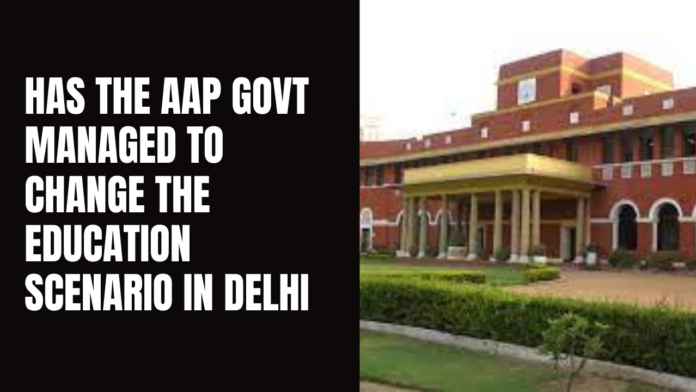Dr Ishita Sahwney
There is a saying that goes, “If a tree’s roots are strong, then the whole tree will be strong from its roots to branches, and from branches to leaves.” Education is that strong root of a nation. If it is strong, deep, and rightly given, then everything in a country can stand strong. But if it is weak, poor, or manipulated, then nothing can stop a nation from destruction. No doubt, a country’s education system is largely responsible for determining the progress of the nation. A highly reformed and advanced education system can shape the future of a country in many incredible ways. However, this hasn’t always been the scenario as the government kept changing. Every 5 years, the government changes, and so do the reforms that every government brings.
However, gone are the times when schools in Delhi, especially government schools, had low-to-average infrastructure. This doesn’t hold true today because the current government has worked on changing this scenario. The AAP government has made efforts to bring a never-seen-before change in the education sector in Delhi. It is not wrong to say that since the time India attained independence, some of the changes that the people have been looking for, can finally be seen. The Aam Aadmi party, which is governing the capital of India, has made moves in the education sector that has caught everyone’s attention. Let’s shed some light on 5 ways the AAP government brought educational reforms in Delhi.
Ensuring quality education
The foremost idea on which the AAP government stressed in the educational sector is quality education. The government has been trying to bridge the gap between quality education and the masses. The AAP government believes that quality education is not just for people of the higher or elite class but for all. One cannot divide quality education among the people according to the class they belong to. If you tag quality education as “luxury,” you are giving a biased answer. However, the AAP government made this quality education accessible for all no matter their class or financial status.
Unchanged fees pattern
Another way in which the AAP government made a positive impact was by not increasing fees in the private schools in Delhi. One of the biggest problems for parents of school-going children was the ever-increasing fees of the schools. To address this problem, the AAP government decided to restrict the fee hike in schools for two years. This came as a big relief to parents who sent their children to schools that continually kept increasing the fees.
Training the staff
The government focused on training the staff that would help strengthen the educational foundation. The best teacher training practices from abroad were included to encourage peer learning among the teachers. The government provided several opportunities for teachers to learn life-changing experiences and give a boost to their professional growth.
New curricular reforms
The Arvind Kejriwal-led government introduced new curricular reforms to reduce the failure rates in Class 9. Further, the happiness curriculum and entrepreneurship curriculum were also included to ensure the well-being of students and nurture their critical thinking capabilities. The teachers, apart from taking care of the emotional well-being of the students, also analyzed the problem-solving capabilities of the students.
Revamped infrastructure
The AAP government looked forward to transforming the infrastructure of the schools in Delhi. It ensured that all the schools fulfilled the criteria for basic infrastructure facilities and had new classrooms with digital boards. The laboratories and libraries were also upgraded with advanced equipment and fresh books. This helped attract the students and motivated them to learn in an advanced environment. The inclusion of smart boards, well-ventilated auditoriums, and enhanced sports facilities brought a significant change in the number of students excelling in all aspects.
The drawbacks
Students lacking reading abilities
While there were significant changes in the education sector, the government still holds some scope for improvement in certain aspects. In many schools, the students of Classes 8 and 9 are non-readers who are unable to recognize sentences and their meanings. Many students do not have even basic reading abilities and hence, are considered non-readers.
New schools- just a dream
The government promised to build hundreds of new schools so that no one remains uneducated. However, they are yet to finalise the land for building those schools. Apart from this, many new schools started by the government are still working under tin sheds.
Teachers awaiting permanent posts
The government planned to appoint many teachers but they continue to struggle to hire the same. The teachers need to undertake an exam to get hired in government schools and get a permanent job. Further, the process is long enough which is why many of the teachers are holding guest posts rather than getting permanent posts.
No new colleges
Building new colleges is another challenge before the government, on which it is mandatory to work. While the government promised to open new colleges, none was opened in the initial 2-3 years. The government seems to be late in realizing that DU is the only university to affiliate the colleges.
The Bottom Line
Every government always gets a fair chance to make changes for the better and shape the country’s future. The Delhi government is trying hard to improve the scenario in the education sector and overcoming the challenges is a task for them.
